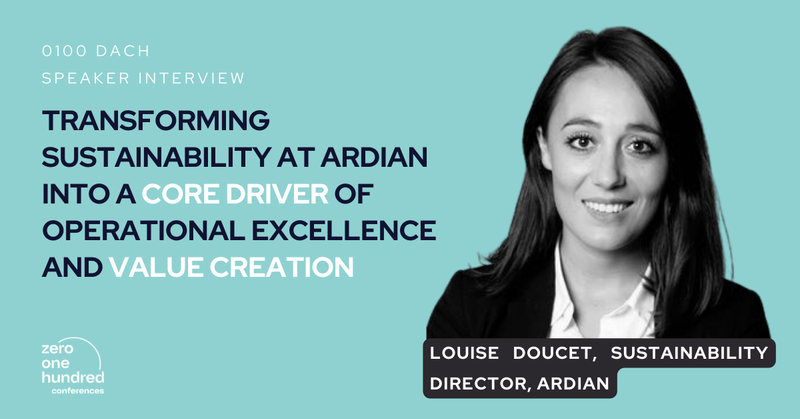Ardian has been at the forefront of integrating ESG into its investment strategies since 2008, transforming sustainability from a “soft topic” to a core driver of operational excellence and value creation. In this interview, Louise Doucet, Sustainability Director at Ardian discusses the firm’s comprehensive approach to ESG across its investment cycle, the challenges of ESG reporting in private markets, and the growing role of sustainability in valuations and exit opportunities. She also shares insights into the evolving ESG landscape, including trends in the DACH region and the future of responsible investing.

Louise Doucet will be speaking at 0100 DACH from February 18-20 in Vienna on the panel "Investing for Impact: ESG Transformation from Soft Topic to Hard Fact" alongside Stephanie Hubold, Head of ESG at Altor Equity Partners, and Anna Olsson, ESG Director at CapMan Group.
Ardian has been incorporating ESG into its investment strategies since 2008. How has the company’s approach to ESG evolved from being a risk mitigation process to becoming an integral part of your investment strategy?
Indeed, in 2008, we launched our Sustainability program with a commitment to profit sharing at exit. Since then, 33,000 employees from 46 exited portfolio companies have benefited from this initiative.
At Ardian, Sustainability is not just a component of our process; it is the cornerstone of our approach to operational excellence and value creation. Our mission is to integrate Sustainability as a key element of our investments and operations, establishing more resilient standards and fostering responsible growth.
Over the years, Ardian has developed a comprehensive Sustainability Engagement Program that covers 98% of our AuM. Since 2009, we have individually supported 190 portfolio companies and assets. Additionally, since 2011, we have assessed and offered engagement sessions to 353 GPs.
With different Private Equity activities from buyouts to growth, secondaries, etc. Are there any specific challenges depending on the activity regarding ESG reporting?
Ensuring transparency to our clients is one of Ardian’s top priorities. We report on the ESG performance of our funds through dedicated reports.
The major challenges in reporting, within the context of Private Markets, are data coverage and data quality. We have implemented control processes early in the data value chain for our direct activities. Through our non-controlling activities, we invest in approximately 20 000 companies or assets through 1 500 funds. Given the magnitude of data points, we are supported by third-party providers to ensure the robustness and traceability of the data used for our regulatory and non-regulatory ESG reporting.
To support this capacity, we have an ESG Data Director in the Sustainability team of Ardian, David Chemla, and we operate hand-in-hand with our Fund Finance colleagues.
How do ESG factors influence valuations and exit opportunities for portfolio companies, and have you seen these translate into tangible financial outcomes?
The influence of ESG factors in the valuation of portfolios has grown significantly. There is a real “fly to Sustainability quality” and “escape from low Sustainability quality.
ESG factors can lead to premiums and discounts, although these are rarely precisely quantified. Similarly, the ROIsation of the evolution of our portfolio Sustainability performance is not tangibly captured.
The CSRD will likely accelerate the transparency and accountability regarding the double materiality of ESG. As more ESG data and benchmark become available, investors may manage their allocation more dynamically with limits on identified ESG risks.
How is Ardian integrating ESG considerations into operational due diligence processes?
ESG is integrated at the different stages of the investment cycle across all Ardian activities, with common features including systematic ESG due diligence. The approach is tailored for each strategy according to its specific characteristics.
For instance, for our Private Credit strategy, we conduct an extensive dual ESG analysis during the due diligence phase, based on our proprietary ESG deal-kit:
At company level: identifying SDG contribution, material ESG issues, company’s maturity level given industry sector/county and potential ESG roadmap implementation.
At equity sponsor level: analyzing the robustness of the GP’s ESG practices and their capacity to steer the company towards better ESG performance during the investment period.
Is there still a perception that achieving financial returns comes at the expense of staying committed to sustainable and impactful investing?
On the contrary, our Sustainability approach aligns with our fiduciary duty to protect and create value for our clients.
Since the launch of our Sustainability Program, we have seen ESG performance as a driver for stronger resilience for our portfolios, enabling them to better navigate global economic, environmental and social tensions.
Sustainability benefits our business, serving both our portfolios as well as our clients as an efficient lever for risk mitigation and for value creation.
What trends do you foresee in ESG-focused private equity investments in the DACH region, and how would you compare it to France’s ecosystem?
In comparison to the French ecosystem, our DACH LPs and portfolios have been highly focused on ESG regulation.
To address this need, we organized dedicated engagement sessions on implementing the SFDR and CSRD, within the context of Private Markets, notably through our Ardian Circle platform. This platform is a community of executives and decision-makers from Ardian’s portfolio, designed to facilitate peer interactions, enable networking, and foster solutions on social and environmental challenges.
To support this capacity, our Sustainability team at Ardian includes an ESG Regulatory expert, Alice Bordas.

